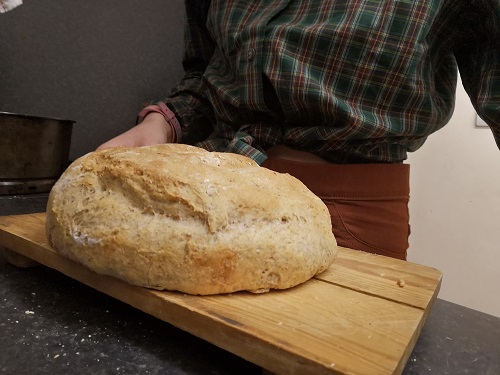Catered vs self-catered halls

How to choose between catered or self-catered accommodation at the RAU, and some tips if you are deciding to be self-catered.
By Jess Palmer, 1st Year, BSc (Hons) Agriculture
Being self-catered may seem different, it may seem a world away from those hearty family meals we are all used to, but as I soon learnt it can be just as easy and simple to recreate that same good food whilst you are at university. When deciding on whether to be self-catered or catered for it is important to considerer these things:
Are you able to cook or willing to learn?
You don’t have to have much experience and it doesn't take long before you're whipping up good meals in the kitchen, the important thing is if you are willing to put the time in.
Timing is also another big thing
If you know you're going to be busy and not have that much time to cook for yourself, are you going to plan your meals in advance and bulk make or would it be easier to be catered for? That being said, you should be aware of your own habits and schedule, like if you're a morning person or not and therefore breakfast would be served too late or dinner too early to fit around your own habits. With this in mind being self-catered would be the better option.
Independence
Being self-catered allows you to experience true independence and growth, and makes it easier to move away from home. In your second and third year when you’re not living on campus, rather than throw you in the deep end to learn to cook while your degree gets harder, it means it is one less thing to worry about.
Tips for self-catered students:
So if you do decide to be self-catered, what next? How do you make sure you budget enough money so that you don't run out? How do you make sure you plan your week so that you don't run out of food and you're not just living off ready meals and pot noodles? Here are a few things you can do to avoid these situations:
- Budget: once you get your student loans through, work out how many weeks you have to survive on that money before your next loan payment, and then work out your weekly allowance. Always make sure you try to budget yourself less money than you think you can spend because that way you have some emergency funds. You can always get your parents of older siblings to help you budget.
- Plan your meals out a week in advance. This allows you to spend as little as possible on a food shop as you already know exactly what you want to get. I do this on a Friday and then on the Saturday I go to Aldi and get what I will need for the week. I aim to spend between £15-£20, however normally I can get my weekly shop to cost around £10.
- The summer before you move to university, PRACTICE! I cannot recommend this enough. YouTube student friendly recipes and there are an exponential number of student friendly cookbooks that can give you some inspiration, and I am sure your parents wouldn't mind the night off to allow you to cook.
- Raid the reductions sections at supermarkets. If things are reduced and are past their sell by date the next day, either cook them that night or freeze it. This allows you to buy meat a lot cheaper than normal.
- Make leftovers your friend. On a Sunday I will bulk make a meal, for example a curry and then freeze it, that way I have leftovers for the next week and emergency meals just in case I need one.
- Buy in bulk the staples, for example rice and pasta, or some tinned vegetables just in case.
Make cooking enjoyable. If you enjoy something, you’re going to put more effort into it, this means your meals will be better and taste nicer.